
¹CCC 553
²Acts 15:6-30

¹CCC 553
²Acts 15:6-30
Sign of the Cross
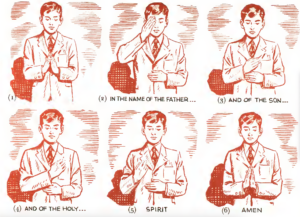
The Our Father
Our Father, Who art in heaven,
Hallowed be Thy Name.
Thy Kingdom come.
Thy Will be done,
on earth as it is in Heaven.
Give us this day our daily bread.
And forgive us our trespasses,
as we forgive those who trespass against us.
And lead us not into temptation,
but deliver us from evil. Amen.
Hail Mary
Hail, Mary, full of grace,
the Lord is with thee.
Blessed art thou amongst women
and blessed is the fruit of thy womb, Jesus.
Holy Mary, Mother of God,
pray for us sinners,
now and at the hour of our death.
Amen.
Glory Be
Glory be to the Father, and to the Son, and to the Holy Spirit.
As it was in the beginning, is now, and ever shall be, world without end.
Oh My Jesus
O my Jesus, forgive us our sins, save us from the fire of hell, lead all souls to heaven,
especially those who are in most need of Thy mercy.
Hail Holy Queen
Hail, Holy Queen, Mother of Mercy,
our life, our sweetness and our hope.
To thee do we cry,
poor banished children of Eve.
To thee do we send up our sighs,
mourning and weeping in this valley of tears.
Turn then, most gracious advocate,
thine eyes of mercy toward us,
and after this our exile
show unto us the blessed fruit of thy womb, Jesus.
O clement, O loving,
O sweet Virgin Mary.
Litany of the Seven Sorrows
Lord, have mercy on us.
Christ, have mercy on us.
Lord, have mercy on us.
Christ, hear us.
Christ, graciously hear us.
God the Father of heaven, have mercy on us.
God the Son, Redeemer of the world, have mercy on us.
God the Holy Spirit, have mercy on us.
Holy Trinity, one God, have mercy on us.
Holy Mary, pray for us.
Holy Mother of God, pray for us.
Holy Virgin of virgins, pray for us.
Mother of the Crucified, pray for us.
Sorrowful Mother, pray for us.
Mournful Mother, pray for us.
Sighing Mother, pray for us.
Afflicted Mother, pray for us.
Desolate Mother, pray for us.
Mother most sad, pray for us.
Mother set around with anguish, pray for us.
Mother overwhelmed by grief, pray for us.
Mother transfixed by a sword, pray for us.
Mother crucified in thy heart, pray for us.
Mother bereaved of thy Son, pray for us.
Sighing Dove, pray for us.
Mother of Dolors, pray for us.
Fount of tears, pray for us.
Sea of bitterness, pray for us.
Field of tribulation, pray for us.
Mass of suffering, pray for us.
Mirror of patience, pray for us.
Rock of constancy, pray for us.
Remedy in perplexity, pray for us.
Joy of the afflicted, pray for us.
Ark of the desolate, pray for us.
Refuge of the abandoned, pray for us.
Shield of the oppressed, pray for us.
Conqueror of the incredulous, pray for us.
Solace of the wretched, pray for us.
Medicine of the sick, pray for us.
Help of the faint, pray for us.
Strength of the weak, pray for us.
Protectress of those who fight, pray for us.
Haven of the shipwrecked, pray for us.
Calmer of tempests, pray for us.
Companion of the sorrowful, pray for us.
Retreat of those who groan, pray for us.
Terror of the treacherous, pray for us.
Standard-bearer of the martyrs, pray for us.
Treasure of the faithful, pray for us.
Light of confessors, pray for us.
Pearl of virgins, pray for us.
Comfort of widows, pray for us.
Joy of all saints, pray for us.
Queen of thy servants, pray for us.
Holy Mary, who alone art unexampled, pray for us.
Pray for us, most Sorrowful Virgin, that we may be made worthy of the promises of Christ.
Let us pray: O God, in whose Passion, according to the prophecy of Simeon, a sword of grief pierced through the most sweet soul of Thy glorious Blessed Virgin Mother Mary: grant that we, who celebrate the memory of her Seven Sorrows, may obtain the happy effect of Thy Passion, who lives and reigns world without end. Amen.
Apostles Creed
I believe in God,
the Father almighty,
Creator of heaven and earth,
and in Jesus Christ, his only Son, our Lord,
who was conceived by the Holy Spirit,
born of the Virgin Mary,
suffered under Pontius Pilate,
was crucified, died and was buried;
he descended into hell;
on the third day he rose again from the dead;
he ascended into heaven,
and is seated at the right hand of God the Father almighty;
from there he will come to judge the living and the dead.
I believe in the Holy Spirit,
the holy catholic Church,
the communion of saints,
the forgiveness of sins,
the resurrection of the body,
and life everlasting.
Amen.
 First Sorrow: Mary Hears the prophecy of Simeon in the Temple
First Sorrow: Mary Hears the prophecy of Simeon in the Temple
And behold there was a man in Jerusalem named Simeon, and this man was just and devout, waiting for the consolation of Israel; and the Holy Ghost was in him. And he had received an answer from the Holy Ghost, that he should not see death, before he had seen the Christ of the Lord. And he came by the Spirit into the temple. And when his parents brought in the child Jesus, to do for him according to the custom of the law, He also took him into his arms, and blessed God, and said: Now thou dost dismiss thy servant, O Lord, according to thy word in peace; Because my eyes have seen thy salvation, Which thou hast prepared before the face of all peoples: A light to the revelation of the Gentiles, and the glory of thy people Israel. And his father and mother were wondering at those things which were spoken concerning him. And Simeon blessed them, and said to Mary his mother: Behold this child is set for the fall, and for the resurrection of many in Israel, and for a sign which shall be contradicted; And thy own soul a sword shall pierce, that, out of many hearts, thoughts may be revealed. (Luke 2:25-35)
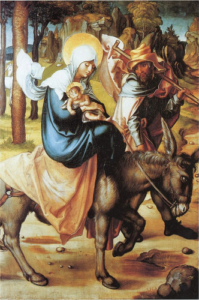 Second Sorrow: Mary flees with Joseph into Egypt to save Jesus
Second Sorrow: Mary flees with Joseph into Egypt to save Jesus
And after they were departed, behold an angel of the Lord appeared in sleep to Joseph, saying: Arise, and take the child and his mother, and fly into Egypt: and be there until I shall tell thee. For it will come to pass that Herod will seek the child to destroy him. Who arose, and took the child and his mother by night, and retired into Egypt: and he was there until the death of Herod: That it might be fulfilled which the Lord spoke by the prophet, saying: Out of Egypt have I called my son. (Matthew 2:13-15)
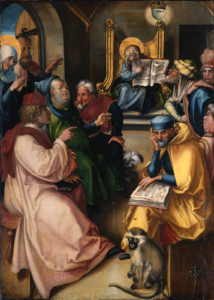 Third Sorrow: Mary loses Jesus and finds Him again in the Temple
Third Sorrow: Mary loses Jesus and finds Him again in the Temple
And his parents went every year to Jerusalem, at the solemn day of the pasch, And when he was twelve years old, they going up into Jerusalem, according to the custom of the feast, And having fulfilled the days, when they returned, the child Jesus remained in Jerusalem; and his parents knew it not. And thinking that he was in the company, they came a day's journey, and sought him among their kinsfolks and acquaintance. And not finding him, they returned into Jerusalem, seeking him. And it came to pass, that, after three days, they found him in the temple, sitting in the midst of the doctors, hearing them, and asking them questions. And all that heard him were astonished at his wisdom and his answers. And seeing him, they wondered. And his mother said to him: Son, why hast thou done so to us? behold thy father and I have sought thee sorrowing. And he said to them: How is it that you sought me? did you not know, that I must be about my father's business? 50 And they understood not the word that he spoke unto them. (Luke 2:41-50)
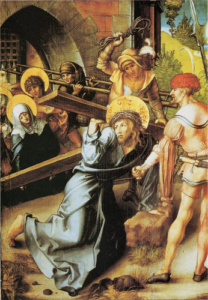 Fourth Sorrow: Mary meets Jesus carrying the cross on the way to Calvary
Fourth Sorrow: Mary meets Jesus carrying the cross on the way to Calvary
And there followed him a great multitude of people, and of women, who bewailed and lamented him. But Jesus turning to them, said: Daughters of Jerusalem, weep not over me; but weep for yourselves, and for your children. For behold, the days shall come, wherein they will say: Blessed are the barren, and the wombs that have not borne, and the paps that have not given suck. (Luke 23:27-29)
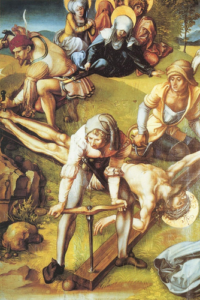 Fifth Sorrow: Mary is present at the Crucifixion and Death of Jesus
Fifth Sorrow: Mary is present at the Crucifixion and Death of Jesus
Now there stood by the cross of Jesus, his mother, and his mother's sister, Mary of Cleophas, and Mary Magdalen. When Jesus therefore had seen his mother and the disciple standing whom he loved, he saith to his mother: Woman, behold thy son. After that, he saith to the disciple: Behold thy mother. And from that hour, the disciple took her to his own. Afterwards, Jesus knowing that all things were now accomplished, that the scripture might be fulfilled, said: I thirst. Now there was a vessel set there full of vinegar. And they, putting a sponge full of vinegar about hyssop, put it to his mouth. Jesus therefore, when he had taken the vinegar, said: It is consummated. And bowing his head, he gave up the ghost. (John 19:25-30)
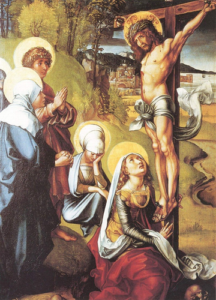 Sixth Sorrow: Mary receives the dead body of Jesus in her arms
Sixth Sorrow: Mary receives the dead body of Jesus in her arms
Out of the depths I cry to thee, O Lord!
Lord, hear my voice!
Let thy ears be attentive
to the voice of my supplications!
If thou, O Lord, shouldst mark iniquities,
Lord, who could stand?
But there is forgiveness with thee,
that thou mayest be feared.
I wait for the Lord, my soul waits,
and in his word I hope;
my soul waits for the Lord
more than watchmen for the morning,
more than watchmen for the morning.
O Israel, hope in the Lord!
For with the Lord there is steadfast love,
and with him is plenteous redemption.
And he will redeem Israel
from all his iniquities.
Psalm 130
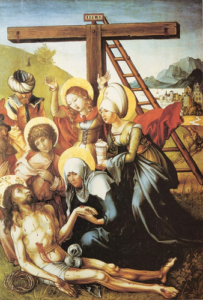 Seventh Sorrow: Mary accompanies Jesus to His Burial
Seventh Sorrow: Mary accompanies Jesus to His Burial
And behold there was a man named Joseph, who was a counsellor, a good and just man, (The same had not consented to their counsel and doings;) of Arimathea, a city of Judea; who also himself looked for the kingdom of God. This man went to Pilate, and begged the body of Jesus. And taking him down, he wrapped him in fine linen, and laid him in a sepulchre that was hewed in stone, wherein never yet any man had been laid. And it was the day of the Parasceve, and the sabbath drew on. And the women that were come with him from Galilee, following after, saw the sepulchre, and how his body was laid. And returning, they prepared spices and ointments; and on the sabbath day they rested, according to the commandment.
G’day! Gave tcsionkjc a go and the selection of games is decent. Customer service was reasonably responsive too. Nothing groundbreaking, but reliable enough for a casual punt. See for yourself: tcsionkjc
Was a bit skeptical at first, but km88legit seems legit. Payouts are quick, which is the most important thing. km88legit
Dewabetvn8 – Heard good things. Thinking of throwing a few bucks in and seeing how it goes. The graphics look pretty slick to be fair! Check it out for yourselves: dewabetvn8
Looking for a reliable bong88 agent? These guys seem legit. Quick responses and helpful. Give them a shout out bong88 agent.
Yo, anyone heard of jjwinclub? My mate was raving about their exclusive promotions. I logged in but have’nt started yet, but pretty dope so far! Check it out and see if it’s your jam. Sign up here jjwinclub.
1xbetkorea is where it’s at for Korean players! Lots of options and a really easy to use interface. You should seriously check it out 1xbetkorea